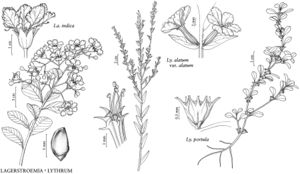Lythrum portula
Feddes Repert. 74: 13. 1967.
Herbs annual, slender, delicate, 0.5–2.5 dm, green, glabrous. Stems frequently creeping and rooting at nodes, procumbent, decumbent, or weakly erect, often branched near base. Leaves opposite; sessile; blade spatulate or oblong to broadly obovate or orbiculate, 5–15 × 3–8 mm, base narrowly attenuate. Inflorescences spikelike. Flowers opposite or alternate, along most of stem, sessile to subsessile, monostylous; floral-tube broadly campanulate, 1 × 1.5 mm; epicalyx segments equal to or to 2 times longer than sepals; sepals 1/3–1/2 floral-tube length, apex dark red; petals early caducous, 0 or 6, white to pink or rose, 1 × 0.7 mm; nectary absent; stamens 6. Capsules surpassing floral-tube, indehiscent, splitting irregularly. Seeds ca. 10–25, subglobose. 2n = 10 (Europe).
Phenology: Flowering summer–fall.
Habitat: Drying ponds, lake margins, shallow water.
Elevation: 1000–2200 m.
Distribution
Introduced; B.C., Calif., Oreg., Wash., Europe, n Africa
Discussion
Lythrum portula was long regarded as belonging to Peplis and is still accepted in that genus in some floras (D. A. Webb 1967). It is widespread in western Asia and Europe and has become established in the northwestern United States and adjacent Canada. It may be expected occasionally elsewhere in cool temperate regions in the flora area, as suggested by a 1999 introduction in Lake County, Ohio, presumably by seeds in soil accompanying plants purchased from a nursery on the West Coast. The Ohio population was recognized as non-native and destroyed (J. K. Bissell, pers. comm.).
Selected References
None.
